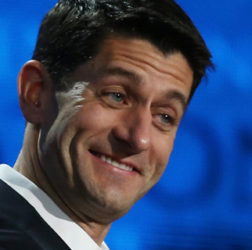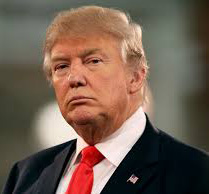WASHINGTON, (Reuters) – The Republican-led U.S. Congress had a rough start to its first session of the Donald Trump era yesterday when a public outcry that included a dressing-down from the president-elect prompted the House of Representatives to backtrack on its plans to defang an ethics watchdog.

It was supposed to have been a ceremonious beginning in which lawmakers set plans to enact Trump’s agenda of cutting taxes, repealing Obamacare and rolling back financial and environmental regulations.
With Trump set to be sworn in as president on Jan. 20, Republicans will control both the White House and Congress for the first time since 2007.
The moment was overshadowed, however, by a an uproar over a surprise move by Republicans in the House of Representatives in a closed-door meeting late on Monday to weaken the independent Office of Congressional Ethics, which is in charge of investigating ethics accusations against lawmakers.
Trump, who campaigned on a pledge to “drain the swamp” and bring ethics reform to Washington, was not pleased by the timing.
“With all that Congress has to work on, do they really have to make the weakening of the Independent Ethics Watchdog, as unfair as it may be, their number one act and priority,” he said on Twitter yesterday.

“Focus on tax reform, healthcare and so many other things of far greater importance!”
The ethics office was created in 2008 following several corruption scandals. Some lawmakers have charged in recent years that it has been too quick to investigate complaints from outside partisan groups.
Lawmakers wanted to have greater control of the watchdog, and inserted changes into a broader rules package, set to pass when the House convened yesterday.
Even before Trump’s tweet, many House Republicans, including top leaders, had opposed the measure and worried about its ramifications. Trump’s tweet prompted an emergency meeting and a quick change of course by Republicans.
“It was taken out by unanimous consent … and the House Ethics Committee will now examine those issues,” said AshLee Strong, a spokeswoman for House Speaker Paul Ryan.
As expected, Ryan was re-elected speaker on a vote of 239-189. He was first elected speaker in October 2015 after predecessor John Boehner retired following repeated revolts by House conservatives.
The speaker election was part of the ceremony involved in the first meeting of the 115th Congress, as the 435 members of the House of Representatives and a third of the 100-member Senate were sworn in.
Ryan, who kept his distance from Trump during his campaign only to embrace him after his Nov. 8 victory, said Republicans understood from the 2016 election that Americans were dissatisfied with Washington.
“We hear you. We will do right by you and we will deliver,” Ryan said.
Trump has made clear he wants to move swiftly to enact proposals he outlined during the campaign such as simplifying the tax code and slashing corporate tax rates.
He also promised to make good on a Republican pledge to repeal and replace Democratic President Barack Obama’s 2010 signature Affordable Care Act – a law better known as Obamacare.
“People must remember that ObamaCare just doesn’t work, and it is not affordable,” Trump said on Twitter yesterday, adding: “It is lousy healthcare.”
In the first step of a process that could take years, Republican Senator Mike Enzi introduced a resolution yesterday to provide for repeal of the law.
House Republicans also took a step to clear the decks later for Obamacare repeal by approving a procedural rule making it harder for Democrats to impede progress on such legislation.
But Republicans face a dilemma on a replacement programne to provide health insurance to people who do not have a plan at work or cannot afford private coverage.
The White House says the law has expanded coverage for 20 million Americans, including an estimated 13.8 million people who buy insurance on exchanges, many who receive tax credits to make it affordable.
“If Republicans repeal the Affordable Care Act they’ll be hastening the demise of Medicare that millions of seniors rely upon for their basic healthcare needs,” White House spokesman Josh Earnest said at a news briefing.
Senate Majority Leader Mitch McConnell did not address Obamacare in remarks on the Senate floor on Tuesday. He has said his top priorities for the new Congress were dealing with the “massive overregulation” he said had been a brake on the U.S. economy and making changes in the tax code to stop companies from moving jobs out of the country.
Republicans might use upcoming spending bills funding government agencies to try to kill some environmental and banking regulations. Trump also is expected to try to use his executive powers toward that end.
Leading Democrats warned of a fierce battle over Obamacare and said they planned to mobilize grassroots support for it. Obama is scheduled to meet today with congressional Democrats to discuss strategies for fending off the Republican attacks on Obamacare.
But Senator Charles Schumer, in his first floor speech as the top Democrat in the Senate, said he was ready to work on some issues with Trump.
“If the president-elect proposes legislation that achieves that – on issues like infrastructure, trade, and closing the carried interest loophole, for instance – we will work in good faith to perfect and, potentially, enact it,” Schumer said.
“When he doesn’t, we will resist.”
House Democratic leader Nancy Pelosi told a packed House chamber that Democrats would work with Trump “wherever we can,” including reforming taxes and trade deals.
Pelosi also warned that Democrats would “stand our ground” and fight Trump and Republicans if they attempt to weaken environmental regulations or civil rights protections.





